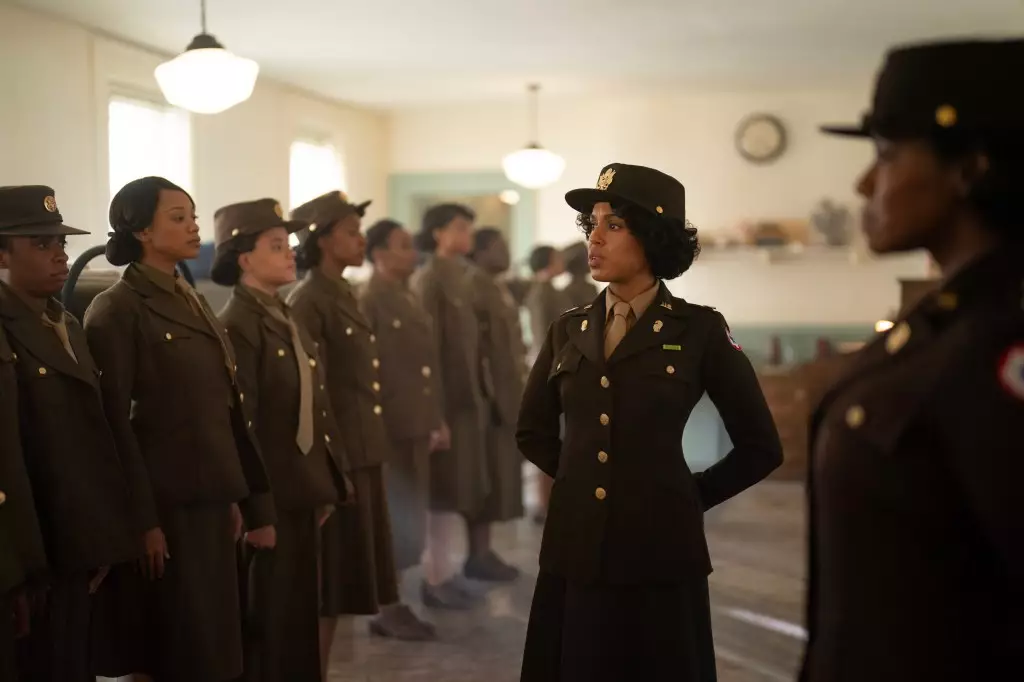In a world inundated with narratives depicting World War II’s battles and heroes, Tyler Perry’s latest film, *The Six Triple Eight,* emerges as a breath of fresh air—illuminating a rarely told facet of the war. Through this cinematic lens, Perry brings to life the exceptional story of the 6888th Central Postal Directory Battalion, a unit composed predominantly of women of color, including many Black women, who faced not only the adversities of war but also the societal challenges of racism and sexism. Their contribution, which involved ensuring the flow of communication between soldiers and their families at a time when letters were the primary form of contact, is both heart-wrenching and uplifting, making this film a significant addition to the pantheon of WWII narratives.
The 6888th’s role in maintaining morale through mail delivery underscores a critical but often overlooked aspect of war—the emotional well-being of soldiers. Major Charity Adams, played with conviction by Kerry Washington, encapsulates the struggles and triumphs faced by these women. The film’s timing is notable; as it prepares for its release on Netflix, there is an urgent need for stories that capture diversity in the narratives of American history. Perry’s film stands as a testament to the power of storytelling and the responsibility filmmakers have to uncover buried histories.
Rather than adopting a purely historical lens, *The Six Triple Eight* is rooted in personal, relatable tales, making it accessible to a wide audience. The film interweaves the individual experiences of its characters with the collective mission of the 6888th, allowing viewers to connect intimately with their struggles. For instance, the film opens with Lena Denniecott King, a character portrayed by Ebony Obsidian, who faces the harrowing uncertainty of her loved one’s fate in the war. This emotional anchor provides a poignant segue into the larger narrative, cleverly linking personal stakes to the broader military objectives.
Perry crafts a dynamic ensemble cast that portrays women with diverse personalities and backgrounds. Each character brings depth to the narrative, shining a light on how different individuals coped with similar challenges. The camaraderie they build amidst the harsh realities of war offers a refreshing perspective on female empowerment. This is particularly notable against the backdrop of predominantly male military leadership, encapsulated in the character of General Halt, played by Dean Norris. Norris’ portrayal serves to highlight the very real obstacles that these women faced, embodying the systemic misogyny and racism that permeated military culture at the time.
The film’s success is bolstered by its production values and creative contributions from seasoned professionals. Costume designer Karyn Wagner and production designer Sharon Busse masterfully transport audiences back to the 1940s, where every detail contributes to the authenticity of the viewing experience. Aaron Zigman’s score augments this emotional journey, pairing well with H.E.R.’s stirring song, “The Journey,” that plays during the film’s end credits—a fitting tribute to those who served in silence.
Perry has found a balance between honoring the gravity of the subject matter and preventing the narrative from delving into excessive sentimentality. This restraint allows the impact of the women’s collective actions to resonate deeply, paving the way for audiences to reflect on their sacrifices without drowning in melodrama. The film also serves as a stark reminder of the importance of recognition and representation. The contributions made by women like Major Adams and her battalion became a crucial element in the Allied victory, yet their stories lived in the shadows for far too long.
As *The Six Triple Eight* approaches its global release on December 20, there’s a significant opportunity for dialogues surrounding women’s roles in the military to gain traction. This film not only highlights the historical importance of the 6888th but also serves as a necessary reflection on contemporary discussions about inclusion and valor. Perry’s work encourages a reevaluation of how history is documented, retold, and forgotten, ultimately advocating for a richer understanding of national narratives that incorporate diverse perspectives.
In an era where social media amplifies the voices of marginalized communities, *The Six Triple Eight* emerges as an essential narrative—a reminder that the stories of these brave women, who performed their duties with dignity and strength despite overwhelming odds, should not only be celebrated but also serve as an educational imperative for future generations. Their legacy, akin to that of the women depicted in *Hidden Figures*, reminds us that every contribution matters in the fabric of history, ensuring that no story remains untold.


Leave a Reply